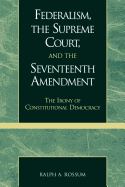
Federalism, the Supreme Court, and the Seventeenth Amendment: The Irony of Constitutional Democracy, by Ralph Rossum, was recommended by Ken M, member of the Repeal the 17th Amendment Discussion Board.
From Amazon Books:
Book Description
Abraham Lincoln worried that the "walls" of the constitution would ultimately be levelled by the "silent artillery of time." His fears materialized with the 1913 ratification of the Seventeenth Amendment which eliminated federalism's structural protection, altering the very nature and meaning of federalism. This is the provocative argument of Ralph A. Rossum's new book which considers the forces unleashed by an amendment to install the direct election of U.S. Senators. Far from expecting federalism to be protected by an activist court, the framers, Rossum argues, expected the constitutional structure, and particularly election of the Senate by state legislatures, to sustain it. In "Federalism, the Supreme Court, and the Seventeenth Amendment" Rossum challenges the fundamental jurisprudential assumptions about federalism. He also provides a powerful indictment of the controversial federalist decisions recently handed down by an activist U.S. Supreme Court seeking to fill the gap created by the Seventeenth Amendment's ratification and protect the original federal design. Rossum's masterful handling of the development of federalism restores the true significance to an amendment previously consigned to the footnotes of history. It demonstrates how the original federal design has been amended out of existence; the interests of states as states abandoned; and federalism left unprotected, both structurally and democratically. It highlights the ultimate irony of constitutional democracy: that an amendment, intended to promote democracy, even at the expense of federalism, has been undermined by an activist court intent on protecting federalism, at the expense of democracy.
About the Author
Ralph A. Rossum is Director of the Rose Institute of State and Local Government and Professor of American Constitutionalism at Claremont McKenna College. He is author of seven books, including "American Constitutional Law", (with G. Alan Tarr).

3 comments:
Considering that Mr. Lincoln played a major role in tearing down numerous Constitutional Walls I dare say that he is not the ideal example to use when talking about protecting the Constitution.
In Liberty,
Republicae-Seditionist
NEWS FROM THE REBELLION
http://1776solution.blogspot.com
Lincoln didn't damage the Constitution, he preserved it. It was the Progressives who damaged it, as Mr. Rossum's outstanding book shows.
Really, well considering that he invaded Sovereign and Independent States, threatened to imprison the entire legislature of Maryland, arrested tens of thousands of people for their views against the war, closed any newspaper that even questioned his policies and signed an arrest warrant for Chief Justice Taney when Taney decided the Lincolns policies were un-constitutional....hmmm..so, he didn't damage the Constitution? Read your history.
Post a Comment